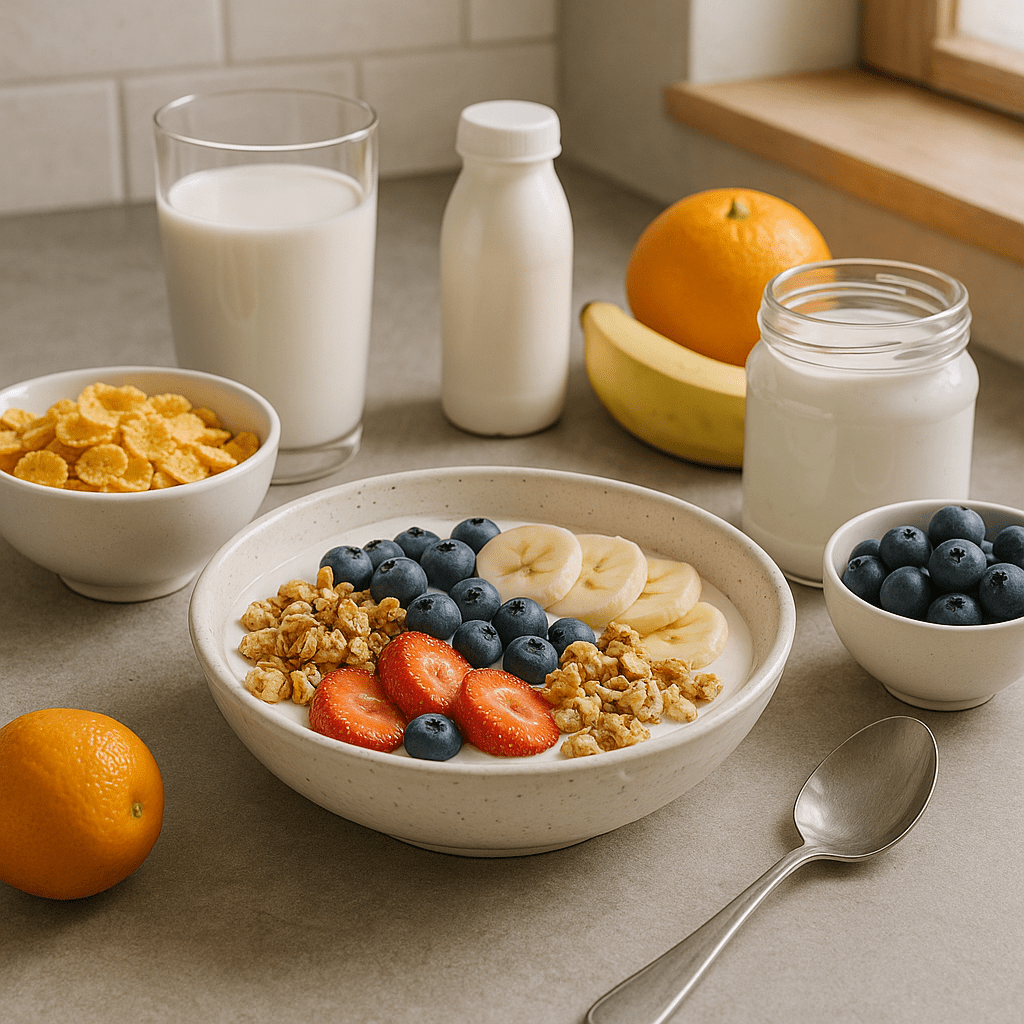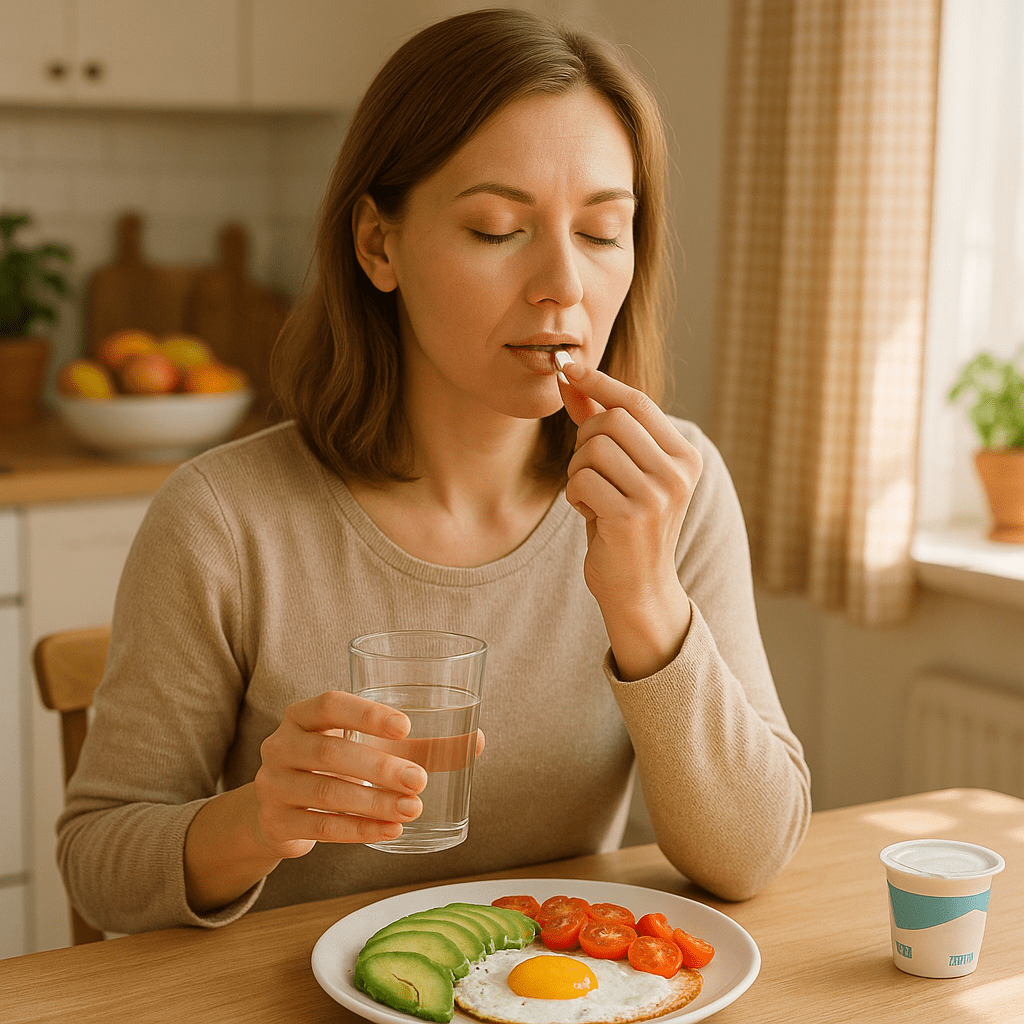Probiotics have long been known as “gerosios bacterios”, which help to maintain healthy intestinal microflora and strengthen the overall health of the organism. However, even quality probiotics do not achieve the desired results if they are used in the wrong way with the wrong hut. Research shows that when probiotics are used at the end of the method, their effectiveness is beneficial to our body.
In this detailed guide, you will learn when it is best to use probiotics, how to combine them with food, how long to use them, and how to maximize their benefits in nutrition and lifestyle. You’ll also find tips on how to choose the right probiotics for your needs, including Gut Prime – a natural solution to intestinal problems.
What are probiotics and why is the time and method of their use important?
Probiotics – these live microorganism cultures, naturally occurring in our intestines or obtained from food products and food supplements. Šios gerosios bacterios play an important role in maintaining the balance of the intestinal microfloras, gerinant wirkinimiņa ir sbydhant imuninę system.

According to some dietary associations, the effectiveness of probiotics depends not so much on their type and quantity, but on the time and method of use. Šios vivos bacterios turi išgyventi tröže per įľľinė įgurų įlųų, when they reach žarnyną, where the ends multiply and are said to be beneficial. Research shows that when different strains of probiotics have different resistance to acid, they have different survival rates.
Specialists in gastroenterology at Kauno Medical University emphasize that when probiotics are used properly, they can increase their survival and colonization in the intestine, and the money they receive is directly related to it.
The type of probiotics has its absorption factors
Probiotic preparations come in various forms – capsules, tablets, powders, liquids with fermented foods. Each form has its own advantages:
- Capsules are tablets – they usually have a special coating that protects bacteria from stomach acid. These forms are generally recommended for consumption.
- Milteliai is liquid – quickly absorbed, but less protected from stomach acid. They can be mixed with food and drinks.
- Fermented food products – natural probiotic products (yogurt, sour milk, kefir, sauerkraut) in which the existing bacteria have already adapted to the digestive system.
- Specializiuoti preparatai – skirti konkriems poreikijams, for example, for women (vaginal microflorai sistemai) with vaikams (pritaikaitki besivystančiai digestive system).
Main factors that determine the absorption of probiotics:
- Stomach acidity – the biggest obstacle for probiotics to reach žarnyną
- Maisto presence skrandyje – gali vekei kaip auspaga nuo sikaden
- The formula of probiotics is quality – quality preparations often have special technologies that ensure better survival
- Drug interactions – some drugs (especially antibiotics) kill good bacteria
If you want to learn more about the effective maintenance of the digestive system, you can visit this information page, where you will find valuable tips for maintaining intestinal health.
When is the best time to take probiotics?
The optimal time to use probiotics is one of the most common topics that consumers ask about. Based on the latest scientific recommendations and experience of Lietuvos gastroenterologists, several important principles can be distinguished.
First of all, the time of use of probiotics depends on the type of preparation and formula. However, most of the research is based on expert opinion on these basic recommendations:
- Consuming food – most probiotics are best absorbed by consuming them with food or within 30 minutes after meals. Meals reduce stomach acidity and create favorable conditions for probiotics.
- Ryte with evening? – studies show when it is best to use probiotics for most people in the morning or in the evening before going to bed, when the acidity of the stomach is lower.
- Use on an empty stomach – some specially coated probiotics can be used on an empty stomach, but in this case it is necessary to follow the manufacturer’s recommendations.
Vilniaus universitos ligoninės Santaros klinikų gastroenterologist emphasizes when consistency is dug into the effectiveness of probiotics. By using them daily at the same time, the best result is the stability of the intestinal microflora.
It is important to take into account individual needs – if you notice that probiotics cause discomfort when used once, try to change the time of use and observe the organism’s reaction.
Probiotikų vartomis kartu su antibioticis
Antibiotic use is one of the most common reasons why people start using probiotics. Antibiotics kill not so much disease-causing, but good bacteria, so the use of probiotics becomes especially important.
Based on the recommendations of the Lietuvos szälištų schokslų universiteto:
- Probiotics should be taken at least 2-3 hours after antibiotic doses, when direct interaction is avoided.
- It is recommended to continue the use of probiotics for at least 1-2 weeks after the entire course of antibiotics, when the intestinal microflora would be restored.
- It is especially important to choose the right probiotics to reduce the risk of antibiotic-induced diarrhea.
- In women’s antibiotic therapy, it is recommended to use probiotics with Lactobacillus strains to prevent vaginal infections.
One of the preparations that provide quality protection in antibiotic therapy is KIKI Health Probiotics for the maintenance of intestinal microflora. These probiotics are scientifically proven to be specially created when they live in the acidic environment of the stomach to maximize the benefits of antibiotic use
.
How long does it take to use probiotics
Duration and frequency of probiotic use depends on specific goals, health conditions have individual needs. Nors probiotics are considered safe for most people, it is important to know the optimal use strategies in different cases.
Naudinga singled out several main scenarios for the use of probiotics:
- Short-term use (2-4 weeks):
- A course of antibiotics
- For digestive system infections
- Kelionių metu (for the prevention of travelers’ diarrhea)
- Vidutinės trūmės vartomis (1-3 months):
- For the reduction of the symptoms of the gastrointestinal tract syndrome
- For the prevention of seasonal immune problems
- Stressful periods
- Long-term use (6 months is longer):
- In cases of chronic digestive disorders
- Nuolatinio immunito strengthening
- In the case of autoimmune diseases (passitarus su likutu
Members of Lietuvos gastroenterologijos associações noticed that for many patients, the most useful is a cyclical strategy – intensive courses of probiotics (e.g., 1-2 months), followed by a 2-4 week break. It allows you to avoid bacteria “pripratimo” is to support natural intestinal microflora.
It is important to remember when the effects of probiotics can occur at different speeds in different people. Some felt the benefits already in the first days, others need 2-3 weeks of continuous use when they notice positive changes.
Immunity strengthening is one of the main reasons why people choose probiotics. For those who want to know more about immune support, we recommend that you consider a food supplement for immune strengthening, which can be perfectly combined with probiotics.
Probiotics, nutrition and lifestyle – how to increase efficiency
Taking probiotics alone, without paying attention to nutrition and lifestyle, will not give maximum results. In order to achieve the best health effect, it is important to create a favorable environment for the reproduction and activity of good bacteria in the intestine.
Here are the main factors that help maximize the effectiveness of probiotics:
The role of prebiotics
Prebiotics are insoluble fibers that serve as “food” for good intestinal microflora. Popular sources of prebiotics in Lithuania:
- Garlic and onions
- Chicory roots
- Jerusalem artichokes
- Banana
- Oats
- Flaxseed
Nutritionists recommend consuming at least 5-10 g of prebiotic fibers daily to ensure optimal activity of intestinal bacteria. Combining probiotics and prebiotics – synbiotics – can increase the survival and efficiency of good bacteria by up to 60-80%.
Natural sources of probiotics
Lithuanian culinary tradition is rich in fermented products, which are excellent natural probiotics:
- Sauerkraut – a traditional Lithuanian source of probiotics, rich in Lactobacillus bacteria
- Kefir and sour milk – contain various strains of probiotic bacteria
- Homemade yogurts without preservatives
- Sauerkraut and other vegetables
These natural probiotics are best consumed daily, combined with probiotic supplements during particularly intense periods – after a course of antibiotics, during the cold season, or when experiencing stress.

Lifestyle factors that affect the effectiveness of probiotics
It is equally important to pay attention to factors that can reduce the effectiveness of probiotics:
- Stress – long-term stress negatively affects intestinal motor function and can weaken colonies of good bacteria. Stress management techniques (meditation, breathing exercises) can help maintain a healthy intestinal microflora.
- Alcohol and caffeine – excessive consumption can disrupt the balance of intestinal microbiota. It is recommended to limit alcohol consumption and coffee intake to 1-2 cups per day.
- Sleep – quality sleep is essential not only for overall health, but also for the intestinal microbiome. Studies show that lack of sleep can reduce the diversity of beneficial bacteria.
- Physical activity – regular, moderate-intensity physical activity improves intestinal peristalsis and helps maintain a healthy microflora.
A comprehensive approach to intestinal health, combining probiotics with proper nutrition and a healthy lifestyle, gives the best results.

For those looking for natural solutions that strengthen both the gut and immune system, a probiotic-adaptogen immune system combination that combines the power of probiotics and immune-boosting herbs could be beneficial.
Conclusions
The timing and method of probiotic consumption can have a significant impact on their effectiveness and benefits. In summary, we can highlight the following key principles:
- Most probiotics are best absorbed when taken with food or within 30 minutes of a meal.
- When taking antibiotics, probiotics should be taken at least 2-3 hours after a dose of the antibiotic.
- The duration of probiotic use depends on the goal: 2-4 weeks is sufficient for short-term support, while chronic conditions may require long-term use.
- To achieve maximum effect, it is important to combine probiotics with prebiotics and natural fermented products.
- A healthy diet, proper lifestyle and stress management enhance the effects of probiotics.
It is worth remembering that each person’s body and its microflora are unique, so it is recommended to monitor your body’s reactions and, if possible, consult a healthcare professional for individual recommendations. Properly selected and used probiotics can be an excellent tool for maintaining intestinal health, strengthening immunity and improving overall well-being.
Frequently Asked Questions
1. Is it better to take probiotics before or after meals?
Most studies show that probiotics survive and work better when taken with food or within 30 minutes of eating. It is especially beneficial to take them with food that contains healthy fats, as this helps protect the bacteria from stomach acid.
2. Can probiotics be taken at the same time as antibiotics?
No, it is recommended to take probiotics and antibiotics separately, keeping at least a 2-hour gap. Probiotics should be continued for at least a week after the end of a course of antibiotics to restore the intestinal microflora.
3. How long does it take for probiotics to start working?
Mild improvements in digestion can be felt within a few days, but benefits to immunity or microbiota balance may not be apparent until 2-4 weeks of consistent use.
4. Do children and women need special probiotic formulas?
Certain probiotics are specifically formulated for female reproductive health or the developing microbiome of children. These probiotics are often recommended by healthcare professionals based on individual needs.
5. Can you get enough probiotics from food alone?
Fermented foods are an excellent source of probiotics, but a busy lifestyle, diet, or certain health conditions may make high-quality supplements a useful additional source of probiotics.


